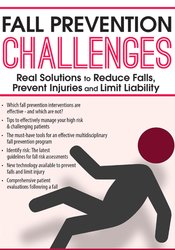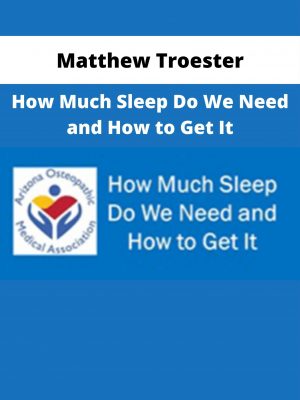M. Catherine Wollman – Fall Prevention Challenges: Real Solutions to Reduce Falls, Prevent Injuries and Limit Liability
$199 Original price was: $199.$76Current price is: $76.
Shopping Instructions:
- DISCOUNT 15% : SHOP15
- Product Delivery: Within 1 – 12 hours after purchase.
Healthcare professionals are increasingly aware of the importance of fall data, adverse effects from falls and limited staffing resources to provide 1:1 supervision to prevent falls.
M. Catherine Wollman – Fall Prevention Challenges: Real Solutions to Reduce Falls, Prevent Injuries and Limit Liability
Falls frequently result in significant adverse effects not only to patients but also to families and institutions. The far-reaching effects of falls make fall prevention an important topic for all healthcare providers. Falls are associated with increased morbidity and mortality and are frequently a source of litigation and insurance claim denial. The impact of falls is extensive from psychologically to financially. The complex multifactorial causes of falls, such as cognitive disorders, gait impairment and environmental factors, make fall prevention a challenge; however, there are evidence-based interventions available to mitigate the risks for even the most challenging situations.
Healthcare professionals are increasingly aware of the importance of fall data, adverse effects from falls and limited staffing resources to provide 1:1 supervision to prevent falls. This seminar will provide realistic, efficient, and effective solutions to address falls. Learn best practice guidelines, evidenced-based interventions and prevention strategies, as well as how to apply this knowledge to your practice setting. This seminar will provide a hands-on, logical step-by-step approach to develop effective fall prevention plans to reduce falls, prevent injuries and limit liability. Join me for this comprehensive and dynamic seminar to explore your challenges and develop solutions for your struggles with falls.
- Evaluate precipitating causes for falls so that preventative measures can be in place.
- Formulate a comprehensive evaluation for high fall risk patients.
- Analyze medications that are known to contribute in various ways to fall risks.
- Assess the risk for adverse patient outcome and need for urgent intervention.
- Determine the tools necessary for a multidisciplinary fall prevention program.
- Select patient-specific fall prevention interventions for a successful fall prevention plan.
- Evaluate the impact of common gait disorders on fall risk.
How to Prevent Falls Before They Occur
- Who is likely to fall?
- Which risk factors can we modify?
- Precipitating causes – what to watch for
- Institutional barriers – avoiding 1:1s
- Important implications of co-morbidities
- The benefits of vitamin D
Fall Risk Assessment
- Current guidelines
- Who should we screen?
- Multi-factorial causes of falls
- Recommended fall risk assessments
- Fall Prevention Strategies
- What works and what does not
- Addressing alarm fatigue
- Avoiding 1:1s
- Effective evidence-based interventions
- Education & assistive devices
Putting Together a Successful Fall Prevention Program
- Patient specific interventions
- Developing a multidisciplinary program: Roles & responsibilities
- Fall rounds
Would you like to receive M. Catherine Wollman – Fall Prevention Challenges: Real Solutions to Reduce Falls, Prevent Injuries and Limit Liability ?
Patient Evaluation
- History
- Physical exam
- Evaluation tools (POMA tool, Get up and go test, Functional reach test, Berg balance test, Short physical performance battery)
- Diagnostic tests
- Review of Gait Disorders (video)
What to do When a Patient Falls: Hands-On Evaluation
- Assess need for immediate medical care
- Evaluate for acute illness/preceding factors
- Communication with caregivers
- Common injuries
- Goals of care
- Difficult Situations
- Frequent fallers – when injury prevention is your goal!
- Anticoagulation risks
- Prolonged time on floor
- What to do when fractures occur
- Head trauma management
Preventing Risk and Limiting Liability
- Home safety evaluations
- Communication and documentation
- Quality improvement opportunities
- High-risk scenarios: Case studies
- Addressing family concerns with falls
- Managing poor outcomes
Fall Prevention Plan Development
- Apply what we have learned
- Solutions for your biggest challenges
Related products
HEALTH & MEDICAL
Matthew Troester – How Much Sleep Do We Need and How to Get It
HEALTH & MEDICAL
HEALTH & MEDICAL
Regina Meredith – Conscious Media Network with Regina Meredith – Eric Pearl on The Reconnection
HEALTH & MEDICAL
CC11 Workshop 06 – Magical Moments in Couples Therapy – Jette Simon
HEALTH & MEDICAL
Gaia—Creating-High-Voltage-Health-with-Glenn-Streeter-Open-Minds
HEALTH & MEDICAL












